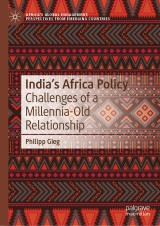Details

India's Africa Policy
Challenges of a Millennia-Old RelationshipAfrica's Global Engagement: Perspectives from Emerging Countries
|
128,39 € |
|
| Verlag: | Palgrave Macmillan |
| Format: | |
| Veröffentl.: | 03.06.2023 |
| ISBN/EAN: | 9789811968495 |
| Sprache: | englisch |
Dieses eBook enthält ein Wasserzeichen.
Beschreibungen
<p>The book analyses how India’s rise to the status of an emerging power has affected New Delhi’s Africa policy, after sketching the historical evolution and normative underpinnings of Indo-African relations, and what challenges it has brought for New Delhi’s engagement with the continent.</p>
<p>India and Africa share a history dating back millennia. Today, India is one of Africa’s biggest trading partner countries, second only to China. The country regularly extends lines of credit worth billions to African nations, and its pharmaceutical producers dominate many African markets; almost one-fifth of India’s oil imports and more than one-quarter of its natural gas imports come from the continent. However, relations between India and Africa are far from being limited to economic cooperation.</p>
<p>The book scrutinises three foreign policy fields: (1) India’s foreign economic policy towards Africa with an in-depth analysis of Indo-African trade, investment and lines of credit; (2) NewDelhi’s development cooperation policy vis-à-vis Africa, its principles, instruments and volume; (3) India’s politico-diplomatic foreign and security policy vis-à-vis Africa, including New Delhi's high-level diplomacy, security and diaspora policy as well as multilateral Africa policy.</p>
<p>India and Africa share a history dating back millennia. Today, India is one of Africa’s biggest trading partner countries, second only to China. The country regularly extends lines of credit worth billions to African nations, and its pharmaceutical producers dominate many African markets; almost one-fifth of India’s oil imports and more than one-quarter of its natural gas imports come from the continent. However, relations between India and Africa are far from being limited to economic cooperation.</p>
<p>The book scrutinises three foreign policy fields: (1) India’s foreign economic policy towards Africa with an in-depth analysis of Indo-African trade, investment and lines of credit; (2) NewDelhi’s development cooperation policy vis-à-vis Africa, its principles, instruments and volume; (3) India’s politico-diplomatic foreign and security policy vis-à-vis Africa, including New Delhi's high-level diplomacy, security and diaspora policy as well as multilateral Africa policy.</p>
<p>Chapter 1. Introduction.- Chapter 2. Research Design.- Chapter 3. Historical and Normative Underpinnings of Contemporary India–Africa Relations.- Chapter 4. Foreign Economic Policy towards Africa.- Chapter 5. Development Cooperation Policy vis-à-vis Africa.- Chapter 6. Politico-Diplomatic Foreign and Security Policy vis-à-vis Africa.- Chapter 7. The Matrix of India’s Africa Policy.- Chapter 8. Conclusion.</p>
<p><b>Philipp Gieg</b> is a postdoctoral researcher at the Chair of International Relations and European Studies, Institute of Political Science and Sociology, University of Würzburg, Germany. He holds a PhD in International Relations from the University of Würzburg. His research and teaching focus on Africa’s international relations, Indian and German foreign policy, global norms as well as blockchain technology and its implications for global governance. He has published on Chinese and US Africa policy, India-EU relations and edited two books on the Democratic Republic of the Congo.</p><p></p>
The book analyses how India’s rise to the status of an emerging power has affected New Delhi’s Africa policy, after sketching the historical evolution and normative underpinnings of Indo-African relations, and what challenges it has brought for New Delhi’s engagement with the continent.<p>India and Africa share a history dating back millennia. Today, India is one of Africa’s biggest trading partner countries, second only to China. The country regularly extends lines of credit worth billions to African nations, and its pharmaceutical producers dominate many African markets; almost one-fifth of India’s oil imports and more than one-quarter of its natural gas imports come from the continent. However, relations between India and Africa are far from being limited to economic cooperation.</p>
<p>The book scrutinises three foreign policy fields: (1) India’s foreign economic policy towards Africa with an in-depth analysis of Indo-African trade, investment and lines of credit; (2) New Delhi’sdevelopment cooperation policy vis-à-vis Africa, its principles, instruments and volume; (3) India’s politico-diplomatic foreign and security policy vis-à-vis Africa, including New Delhi's high-level diplomacy, security and diaspora policy as well as multilateral Africa policy.</p><p></p><p><b>Philipp Gieg</b> is a postdoctoral researcher at the Chair of International Relations and European Studies, Institute of Political Science and Sociology, University of Würzburg, Germany. He holds a PhD in International Relations from the University of Würzburg. His research and teaching focus on Africa’s international relations, Indian and German foreign policy, global norms as well as blockchain technology and its implications for global governance. He has published on Chinese and US Africa policy, India-EU relations and edited two books on the Democratic Republic of the Congo.</p><br><p></p>
<p>The book scrutinises three foreign policy fields: (1) India’s foreign economic policy towards Africa with an in-depth analysis of Indo-African trade, investment and lines of credit; (2) New Delhi’sdevelopment cooperation policy vis-à-vis Africa, its principles, instruments and volume; (3) India’s politico-diplomatic foreign and security policy vis-à-vis Africa, including New Delhi's high-level diplomacy, security and diaspora policy as well as multilateral Africa policy.</p><p></p><p><b>Philipp Gieg</b> is a postdoctoral researcher at the Chair of International Relations and European Studies, Institute of Political Science and Sociology, University of Würzburg, Germany. He holds a PhD in International Relations from the University of Würzburg. His research and teaching focus on Africa’s international relations, Indian and German foreign policy, global norms as well as blockchain technology and its implications for global governance. He has published on Chinese and US Africa policy, India-EU relations and edited two books on the Democratic Republic of the Congo.</p><br><p></p>
Analyses India’s post-liberalisation Africa policy Presents first comprehensive analysis of Narendra Modi’s Africa policy Offers an up-to-date account of Indo-African development cooperation and of New Delhi’s pertinent expenditures
Diese Produkte könnten Sie auch interessieren:

Inclusión educativa de niños, niñas y adolescentes migrantes venezolanos, en Colombia

von: Douglas Jiménez

15,99 €
















